Dr. Paul T. P. Wong’s autobiography, A Lifelong Search for Meaning: Lessons on Virtue, Grit, and Faith, is published in weekly installments. Stay updated here.
In the past, it was always difficult for me to share my conversion without being overwhelmed by emotion because it was a deeply transformative experience, touching the innermost recesses of my being. It comes as a surprise that I am now able to recount this experience without getting a lump in my throat or tears in my eyes, but it remains a “sacred chamber” or “holy ground” where God found me.
It has been so long ago that I have lost count of the years; it occurred probably sometime during December 1958 on a cold and raining evening inside a small chapel, where I surrendered my life and future to God on my knees, with the Rev. Lee Hobel kneeling beside me.
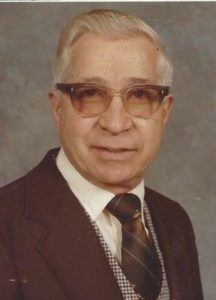
Rev. Lee Hobel
I have lost touch with Lee for many years. I just searched him on the internet and discovered that he died in June 2016 at the age of 93. He was once a junior missionary in Hong Kong, working with the Oriental Mission Society, founded by Charles and Leslie Cowman. Leslie was the author of Streams in the Desert, a book treasured by me and my wife for 20 years as a part of our daily devotion.
Lee will always be remembered as a gentle and humble shepherd, who spoke softly with a smile. His deep spirituality was in his eyes and his demeanor; he literally carried with him “the fragrance of Christ” (2 Cor. 2:16).
My last full-time job in Hong Kong as a police interpreter at the Peak Police Station, a small station with only about 30 policemen and one British Officer in Charge. It was not a busy station, with very few serious crimes except for one murder case. My job was to update the law books and act as the in-between of the policemen and the Officer in Charge; they all called me “師爺” which means Master or Strategist. Most of the time, I sat in my office reading my books.
After my conversion, the Peak Police Station became my “spiritual retreat” where I spent hours each day in prayer and Bible study, and where I learned to witness to the police.
My Conversion
My conversation was not instantaneous. It actually took God more than ten years to bring me to the point of giving my life to God. The seed was sown in St. Stephen’s College Preparatory School (Ch. 14), the watering was done in Pui Ching (Ch. 15), and it finally sprouted in the darkest hour of my life (Ch. 16).
I still do not fully understand the process of Christian conversion, which belongs to the realm of mystery. Perhaps God called me even before I was born; otherwise, why would I have the desire to be a saint ever since my kindergarten days (Ch. 8)? Why did God use so many people, engineer so many circumstances in order to tug my heartstrings and draw me to Himself, despite my continued resistance? What was in me that He would pursue me with his love?
I was once a “Saul,” arguing with Bible teachers, deeming myself more spiritual and righteous than they, with my voluntary “holy” living of self-denial and alms-giving. But God did not punish me, nor did He confront me in a miraculous way. Instead, he melted the hardness of my heart with his compassion until I broke down in repentance and surrender.
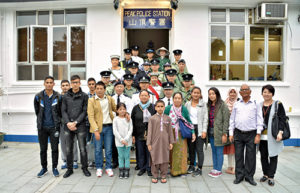
My office was just behind the right window. I was not part of this photo taken during an open house in 2016.
God reached out to me through Lee Hobel when I was returning to the Peak Police Station after one weekend. He happened to sit beside me on the way up the mountain. Gently, he whispered to me, “You look troubled. Could I pray for you?” I looked at his kind face and said, “Sure, I would be happy if you could pray for me.” We then exchanged our telephone numbers and addresses, and he then got off the tram. This casual encounter with a stranger initiated a sequence of events which culminated in my conversion. I usually communicated with him through hand-written letters, sharing with him my circumstances and prayer requests.
My first prayer request was about my father’s sickness. He continually vomited blood and did not respond to either Western or Chinese traditional medicine. Miraculously, he recovered a week later after Lee’s intercessory prayer.
My second prayer request was that the Chinese Government would allow my oldest brother (Ch. 6) to come to Hong Kong. At that time, I had already written many letters without any results. But shortly after this prayer request, the good news finally arrived.
My third prayer request was about our financial difficulties with creditors coming after us all the time (Ch. 16). Again, miraculously, my sister was engaged to a rich man, and she promised to help.
These were just three of my major concerns among several other answered prayers. I began to wonder: How could all these good things happen soon after Lee’s intercessory prayers? Could they be nothing more than coincidences? Could it be just a change of fortune, after many years of bad luck? This internal struggle went on for a few days until one night in my dark room, I finally broke down and cried on my knees uncontrollably like a baby, feeling ashamed of my ungratefulness and unbelief.

The Peak tram, which was pulled uphill by cables.
Therefore, when Lee called me shortly after my secret “repentance” and asked me if I wanted to accept Jesus into my heart as my Lord and Saviour, I said “Yes” without any hesitation. I had run out of excuses for not accepting the invitation, and I was emotionally ready.
Inside that dim chapel, we both knelt down before the altar. He first led me in saying the sinner’s prayer before praying for me. After a minute of silence, we got up, and he gave me a warm and long embrace.
During that life-changing moment, I did not experience an ecstasy of joy or anything out of the ordinary. I just felt a great sense of inner peace, which I had not experienced for a long time. It was like a scared and tired baby finally finding security and comfort in the mother’s embrace. It was also like being relieved of all my burdens and set free from an invisible bondage.
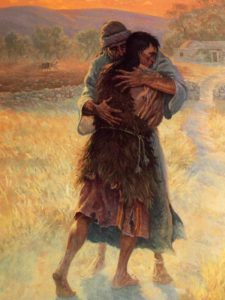
A painting of the parable of the prodigal son.
Prior to this event, I had already experienced several close encounters with God. For example, when evangelists such as Oswald J. Smith made their altar calls, my heart would race faster and I would have to hold onto my chair in case I raised my hand to accept Christ. But this time, I finally stopped resisting God’s invitation. In a simple act of unconditional surrender, I yielded my soul, heart, mind, and my all to God by faith, not knowing how He would use me or where He would lead me.
Throughout our friendship, Lee Hobel never tried to convert me with the Bible, knowing that I already possessed the necessary Biblical knowledge of God’s plan of salvation; instead, he patiently led me to Christ with “cords of human kindness, with ties of love” (Hos. 11:4).
Deep in my heart, I knew that I did not choose God, but He chose me and lightened up my dark soul. He showed me that all the things I had been pursuing were just poor substitutes for the real deal—Christ Himself. But, definitely, something spiritual happened to me that evening and I believed that God was pleased to welcome me home as a prodigal son.
The Meaning of Being Born Again
The next morning, I woke up, realizing that I was now a born-again Christian. “Therefore, if anyone is in Christ, the new creation has come: The old has gone, the new is here! (2 Cor. 5:17)
I gazed at the same white ceiling in my room and then got up without feeling any different. I still had to go about my daily business and deal with many of the same challenges. But God had already changed me from within, in a quiet and imperceptible way, even though my environment remained much the same. True to my character, I threw myself totally into this new adventure with passion and single-minded purpose.
A New Hunger for God’s Word
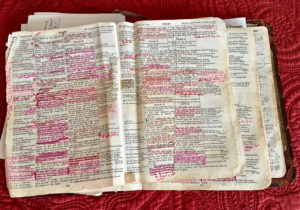
My worn-out Bible from Lee Hobel—my only connection to the past.
Instead of reading academic books from the library, I began to devour the Thompson-Reference Bible given to me by Lee Hobel and other Christian literature. I read it every day until it was worn out.
I found myself immersed in the Psalms daily because I could really identify with the plight of the authors. Many passages in the Psalms gave me profound comfort and strength. My favourite passages are Psalm 23 and Psalm 40:2.
To increase my Bible knowledge, I enrolled in all the correspondence Bible courses I could find, which included the Bible course from Emmanuel Church, Navigators, and Fuller Theological Seminary.
My favorite Christian authors included Wang Ming Dao, Watchman Nee, Hudson Taylor, George Müller, and David Livingstone.
A New Hunger for Prayer
On average, I spent at least an hour a day on my knees praying. I was driven to God’s presence both by personal needs and by a spiritual hunger for communion with God. At times, I felt lost in an overwhelming sense of oneness with God.
I often combined singing with my prayers. My favorite hymn was “Savior, Savior, hear my humble cry; while on others Thou art calling, do not pass me by.”
I started the habit of morning devotions, but my evening prayers tended to be the longest. Throughout the day, I had a song in my heart and a prayer on my lips. I really desired to walk with Christ daily.
A New Hunger for Bible Teaching and Fellowship
My weekends were spent mostly in church activities to the point that my father got angry with me.

Duncan and Winnie with the Seattle Chinese Alliance Church.
Lee Hobel introduced me to Emmanuel English Church At that time, Dr. Charles Roberts, sent by the Bible Institute of Los Angeles, was the pastor, and a very gifted Bible teacher Rev. Duncan Dang was my Sunday School teacher, who later became the Pastor of Seattle Chinese Alliance Church.
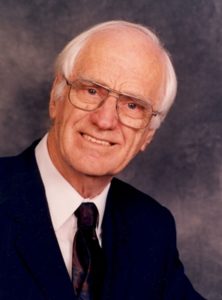
Rev. David Adeney
Rev. David Adeney, well-known in Hong Kong for his work with the Fellowship of Evangelical Students often led the prayer meetings at the Emmanuel Church Book Room. His earnest and spiritual power in intercessory prayers for the young people left a deep impression on me. He later succeeded Dr. Roberts as Pastor of Emmanuel Church.
At that time, we had city-wide revival meetings led by Philip Teng (滕近輝). I was really blessed by his teaching on a deeper spiritual life.
I was also fortunate enough to be part of select group of Christians (less than ten) who learned from Wu En-Te (胡恩德先生); he taught an advanced Bible class in order to train the next generation of Bible teachers. His main emphasis was on being crucified with Christ and he demonstrated with his own life what it was like to die to the world.
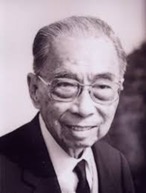
Mr. Wu En-Te (1908-2005)
He was a very well-known pastor of Joy Gospel Church (喜乐堂) for 70 years and President of the Evangel Seminary (播道神學院). However, he refused to be ordained or paid any salary as a matter of principle; he chose to live by faith, depending on the free will offerings from some believers in his church. I am very pleased that many years later one of the members of his church, Dilys Ma, now works for me as my assistant and we share happy memories of our common friends in the church. God’s way is really amazing.
A New-Found Desire to Share My Faith
I first shared my faith with my family members. My mother was my first fruit. She became a devout Christian, praying daily for all her children and grandchildren. I also led some of my younger brothers to Christ. One of them, Joshua, told me one day that he met another devout Christian in the street by the name of Szeto Wei Yun (司徒懷恩). Through Joshua, I became a partner in the Gospel with John Szeto.
John was a tailor apprentice; although he only had a high school education, he was very wise. He had an open face and a ready smile; he was very humble but confident on spiritual matters. He had been mentored by a Navigator; so he passed onto me Dawson Trotman’s principles of discipleship. When the Navigators pulled out from Hong Kong, we took over their operation of Bible Correspondence School and evangelistic efforts.
Together, John and I witnessed for Christ everywhere during the weekend, in public hospitals, slum areas, and exhibitions. We had the privilege of caring for a teenager with cancer and later leading him to Christ. For myself, I even imposed on myself the rule of “No Witness, No Sleep” in addition to Leland Wang’s rule of “No Bible, No Breakfast”. Sometimes, I had to walk the streets after dinner looking for someone who might be interested in the Gospel.
It was through John that I got to know Pastor Wu (胡恩德) and some of the leaders at the Joy Gospel Church. I had the privilege of taking part in an outreach event to neighbourhood children with Szeto Pin through telling a gospel story. Ten minutes before the service, there were only a dozen children at the meeting place; I immediately got to work and went to the streets to round up children and invite them to the church on the second floor. I must have made more than 10 trips until I filled up the church with kids. I was very satisfied that the service was very fruitful.
I was also instrumental in leading several policemen working at the Peak Police Station to Christ. It was deeply satisfying to see big policemen bow down their heads and accept Christ as their Savior. Lee Hobel noticed that God was using me, and encouraged me to serve God fulltime.
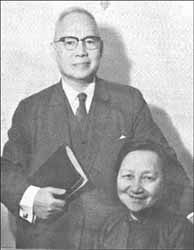
Dr. Leland Wang
A year after my conversion, I began my writing ministry, contributing to all the Christian periodicals in Hong Kong. I still remember that one of my articles was published in Bible Magazine edited by Rev. Stephen Chen (陈终道 圣经报). I was pleasantly surprised that my article was printed right away as the lead article by the well-known Chinese Evangelist Leland Wang (王载) and my Chinese name was Wang Zhaobao (王载宝). Leland Wang was a colleague of Watchman Nee. I considered it a great honour to be associated with Leland, but I never aspired to be an evangelist.
The assurance of my salvation is found both in God’s promises and in my changed life, which did not take place overnight, but through months and years. After my conversion, I still struggled with against carnal desires and unclean thoughts, but I found comfort in knowing that the sacrificial blood of Christ covers all my sins. My salvation does not depend on my good karma, but on the grace of God.
Looking back, I feel so indebted to great Bible teachers when I was just a baby in Christ. I am also grateful for the spiritual fervour of the young people at Emmanuel and Joy Gospel Church—these two local churches were really exceptional in their devotion to Bible teaching and outreach.
Why I Became a Christian
My conversion was a turning point in my life. Prior to that point, I had been struggling with all that was within me to be a saint (聖人). I even earned this title from my second sister-in-law, because I volunteered to wash her baby’s soiled diapers, but I still failed to maintain my own moral standard repeatedly especially in my battle against carnal desires. I also failed miserably in my efforts to find happiness and hope through reading and writing. I was literally at the end of my rope with all my family loading me down with all kinds of problems. Then, something happened—ever so gently, so beautifully. My chance encounter with a loving missionary led to my conversion.
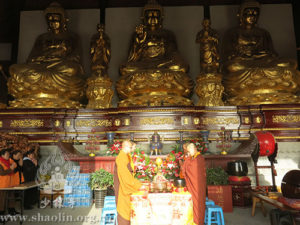
Inside a Shaolin Temple in Tianjin.
Why did I become a Christian and not a Buddhist? I was brought up in Chinese folk religion with a mix of Buddhism, Taoism, and Confucius teachings. My parents brought me to a Buddhist temple at least once a year. As a child, I was scared of the austere atmosphere inside the temple, with its imposing Buddhist statues, the smell and smoke of incense sticks, and chanting monks. As much as I was fascinated by the life story of Shakyamuni Buddha and attracted to many of the Buddhist teachings, I could not overcome my childhood apprehension.
With Christianity, it was a totally different story. My first encounter with Christianity was singing and acting out the happy song of “Walking with Jesus,” taught by a cheerful woman missionary. My exposure to Christian teachings took place in classrooms or lecture halls without the trappings of religious rituals.
Intellectually, I had argued against Christian teaching all through my high-school days, such as pointing out the inconsistencies of the Bible or questioning the lack of evidence. But all these intellectual questions fade away as unimportant when the love of God washes over you again and again like ocean waves.

Planets in the solar system.
I did not come to Christ through reasoning as Lee Strobel, author of A Case for Christ. In fact, I did not have any serious intellectual problem believing in God or in Christ. It seems easier to believe in an intelligent almighty Creator, than to believe that the complex and orderly structure of the cosmos came into existence by chance. If God could create human beings out of dust, he could also appear in human form in the person of Jesus Christ. My previous resistance to Christianity was partly because of my self-righteousness and partly due to my misconception that it was a Western religion.
My conversion was more like C. S. Lewis’ experience as described in his autobiography Surprised by Joy—he was hunted down by a loving God despite all his efforts to maintain his atheistic beliefs. I was ambushed by God through a humble and caring missionary, who modelled after Christ. In many ways, it was just a casual encounter which could have taken place anywhere, when one person reached out to another person. The uniqueness of my case was that Lee Hobel did not give up on me—he pursued me with his phone calls, letters, and prayers.
Another key element of my conversion was the incomparable noble character of Christ—dying a cruel death on the cross to pay the ransom for all sinners. Sacrificial love does not demand a logical explanation. My craziness to deny myself simple pleasures in order to help the poor was nothing compared with the total insanity of Christ dying for those who hated him. Love has its own logic!
My experience of many answered prayers was simply illustrative of the gospel truth, “The saying is sure and worthy of full acceptance, that Christ Jesus came into the world to save sinners” (1 Tim. 1:15). He threw me a rope when I was drowning in my troubles and miseries.
After my conversion, I had no idea where God would lead me, but I believed based on Biblical teachings and all my experiences that “it is God who works in you to will and to act in order to fulfill his good purpose” (Phil. 2:13). The next chapter describes God’s new purpose in my life—and it was definitely not what I had expected.
